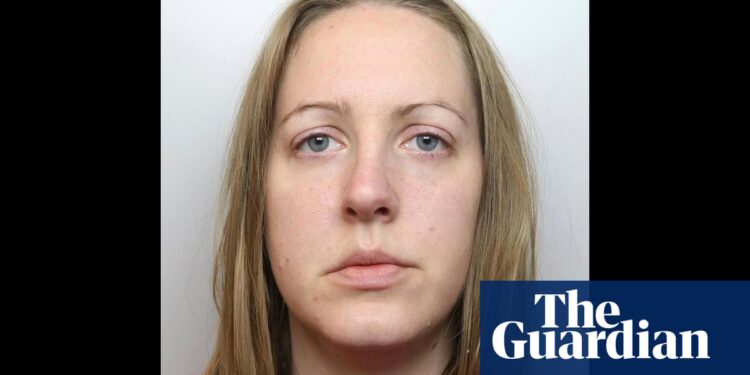Lucy Letby’s lawyer has announced he is seeking to reopen her appeal because the prosecution’s lead medical expert witness, Dr Dewi Evans, has “changed his mind” on some key evidence.
At a press conference on Monday, Mark McDonald said Evans was “not a reliable expert”, and that all the convictions were not safe.
“Today the defence is announcing that it will immediately seek permission from the court of appeal to take the exceptional, but necessary, decision to apply to reopen the appeal of Lucy Letby and immediately review all her convictions,” McDonald said.
He also gave details of new medical expert reports produced for the former nurse’s defence by two consultant neonatologists, which wholly dispute the prosecution evidence for two of the babies Letby was convicted of killing.
The report into one of the babies, Baby O, contests the prosecution evidence against Letby, and alleges that a doctor caused the baby to die by, apparently mistakenly, pressing a needle into the liver while trying to relieve swelling in the abdomen.
Dr Richard Taylor, a consultant neonatologist based in Victoria, British Columbia, who is one of approximately 100 medical and other experts assisting Letby with her defence, said the doctor at the hospital, whom McDonald did not name, must have been aware he had done so.
Taylor said: “From a personal point of view, if this had happened to me, I would be unable to sleep at night, knowing that what I had done had led to the death of the baby and now there is a nurse in jail convicted of murder.”
Letby, 34, was found guilty across two trials of murdering seven babies by injecting them with air, and attempting to murder seven others, when she worked as a nurse in the neonatal unit at the Countess of Chester hospital in 2015 and 2016.
In May, three judges at the court of appeal refused Letby’s application for permission to appeal against the convictions, which was largely based on challenging Evans’ reliability.
Since the trials ended, Evans has, in a range of media interviews, emphatically stood by his conduct as an expert witness. At the trial he alleged that Letby killed babies by injecting air, either down feeding tubes into their stomachs or into their bloodstream, causing lethal air embolisms.
McDonald said: “Remarkably, Dr Evans has now changed his mind on the cause of death of three of the babies.” Evans has said that injecting air down feeding tubes did not kill the babies, and only destabilised them, despite this being the cause of death prosecuted and stated by the court of appeal for three babies.
Evans has also said that he has changed his opinion on Baby C’s death, which at the trial he had said was due to air having been injected into the stomach, noting excess air seen on an X-ray of 12 June 2015. It emerged at the trial that Letby had not worked a shift at the hospital from the day the baby was born, 10 June 2015, to the day of the X-ray.
Evans changed his evidence on the witness stand, and since the trial has said he now believes Baby C was killed by Letby the following night, 13 June 2015, when she was on shift, most likely by injecting air intravenously.
McDonald said: “Dr Evans had said to the jury that Lucy Letby had injected air down a nasal gastric tube and this had led to the death of the three babies. This was repeated to the court of appeal, who may have now been misled when they ruled on the application for leave against the convictions.”
Two consultant neonatologists – specialists in the medical care of premature babies – Dr Neil Aiton and Dr Svilena Dimitrova, have produced reports on babies O and C.
The reports are based on “full access” to the hospital notes, postmortem reports, Evans’ reports, other expert witness statements, and statements from the investigation. In a statement they said they had found medical causes for the deaths and no evidence that the two babies were deliberately harmed.
“Our reports demonstrate that there are identifiable medical reasons why both babies became unwell, sadly did not respond to resuscitation and subsequently passed away,” they said.
“We have provided evidence that Baby O died due to issues related to the resuscitation. Baby C died due to problems caused by failing placental function at the end of the pregnancy. We have seen no evidence of deliberate harm to these babies by anyone.”
At the press conference on Monday, Taylor also said the experts working on Letby’s behalf believed that the evidence supporting Letby’s convictions of attempted murder for injecting two babies with insulin was not reliable.
The CPS has responded to questions about the evidence by pointing to the jury having convicted Letby, and the court of appeal upholding the convictions. Cheshire police confirmed recently that they had questioned Letby in prison in relation to other babies who died or collapsed during her time working at the Chester hospital and Liverpool women’s hospital.
A spokesperson for the Countess of Chester hospital said: “Due to the Thirlwall inquiry and the ongoing police investigations, it would not be appropriate to answer or provide advice on the questions asked at this time.”
The Guardian has approached Evans for comment.







